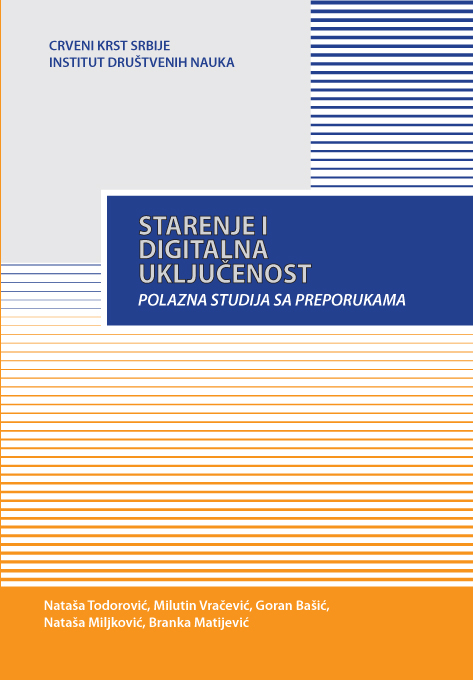Ageing and Digital Inclusion – Baseline Study with Recommendations

The publication “Ageing and Digital Inclusion – Baseline Study with Recommendations” was developed within the framework of the project “Access of Older People to Information and Communication Technologies” implemented by the Red Cross of Serbia in partnership with the Institute of Social Sciences and with the support provided by the United Nations Population Fund (UNFPA) in 2019. The research study included ten older persons from 29 Serbian municipalities each, with a view to estimate the degree of digital inclusion of older persons in Serbia – specifically their awareness of the existence of different online services and the frequency of use. Additionally, four focus group interviews with 42 participants were organised in the qualitative part of the research.
The results show that older persons most commonly use the Internet to communicate with their family members, through Viber or Skype, especially if their children live abroad. This is followed by online games of chess and watching videos and reading news on the internet. The majority of the participants was unaware of the existence of eGovernment portal and its services and a very low number of them ever used it. None of the participants ever used digital application My Doctor to schedule appointments with a physician, or any e-banking application. Reasons for such degree of digital exclusion include insufficient knowledge about the existing services and the ways to use them, mistrust in own level of digital literacy and the capacity to follow instructions, low income that prohibits older person from buying personal computers and perceiving smart telephones as too complicated, the wish to have a higher degree of real life social contacts and general low interest for the Internet as a whole. In summary, the research results show that 43% of all participants do not use internet and that 90% of those who do use it do not use e-services. This means that moving public services completely to the Internet runs the risk of leaving a large part of the older population behind by making the services they need to use more difficult to access, especially those with a lower degree of education and lower income, which will negatively affect their quality of life. If during the development of digital technology we do not pay attention to the rights of older persons to be digitally informed, digitally educated and digitally included this group may lose access many rights they are entitled to.
Authors: Natasa Todorovic, Milutin Vracevic, Goran Basic, Natasa Miljkovic, Branka Matijevic
